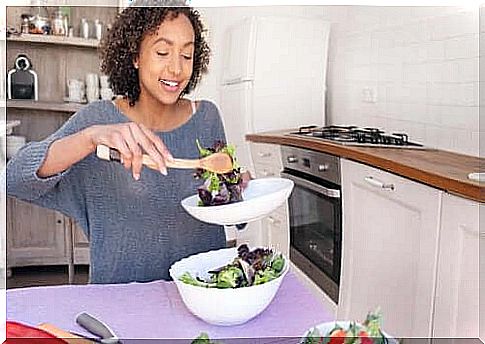5 Options For Cooking Without Salt – Being Parents
The health risks associated with high salt consumption are on the rise. However, it must be recognized that unsalted or at least poorly seasoned foods are not always appetizing. Here are some tips to help you cook without salt without having to sacrifice the flavor of your meals.
There are many people who do not consume salt because they know that it is not good to overdo it. However, the amount of sodium in processed products keeps increasing in our daily diet.
It can cause you to get sick. When this happens, you are advised to follow a low sodium diet. It then becomes difficult to give flavor to the recipes. It is then that we must not forget that there are other ingredients that can restore flavor to food and revive his desire to eat.
5 options for cooking without salt
Here are five excellent alternatives for cooking without salt.
1. Focus on spices
There are many alternatives for cooking, and those who love cooking will not hesitate to find them. We’re talking about herbs and spices here. These two products go very well with vegetables. For example, with tomatoes, carrots, corn, beans, potatoes and peppers, among others. They can also be paired with meat such as beef, chicken, turkey, pork, or seafood.
Some of the most popular herbs are basil, chives, cilantro, parsley, oregano, rosemary and many more. The most common spices are curry, paprika, mustard, pepper, tarragon, garlic, cinnamon, nutmeg, cloves and many others.
Remember that many culinary spices also have proven anti-inflammatory properties, so they are good for you.

2. Cooking with fresh vegetables without salt
In the markets we have at our disposal a wide variety of vegetables and fruits with a low salt content. For example, sundried tomatoes! They bring a lot of flavor to accompany breads and pizzas for example.
We could also mention among these vegetables mushrooms, cherries, carrots and spinach. They are delicious and rich in taste in a nutritious and delicious salad.
3. Eliminate industrial foods from your diet
Prepared foods contain approximately 75% sodium. We must therefore make adjustments in terms of consumption. When we talk about processed foods, we think more particularly of preserves, rice, soups, sauces and other prepared meals.
One way to eliminate or regulate the consumption of these types of products is to read the nutrition information on the packages to find out how much sodium they contain. Another tip, if you buy canned cereal, it is good to rinse it with plenty of water. This will remove the excess salt.
On the other hand, you should reduce the consumption of fats, olives, cured ham, anchovies and pickles. Indeed, all these products go through a salting process necessary for their conservation. Likewise, it is better to avoid frozen vegetables and replace them with fresh ones even if it is a little more difficult to preserve or prepare them.
4. Avoid certain preparations
It is advisable to avoid garlic and onion preparations. Indeed, they contain a lot of salt. Prefer fresh seasonings or better yet dressings.
There are many varieties of vinegars, such as balsamic vinegar, red vinegar, rice vinegar, or white vinegar. To add flavor to the preparation, they should be added at the end of cooking.
5. Go for citrus
Another good alternative to salt to season your food is to opt for a few drops of lime or lime vinegar. In this way, you will get a similar effect to salt, but in a much healthier way.
Plus, you’ll give your dishes an extra amount of vitamin C. Remember that a few drops of lemon can be great in soups, salads, chicken and fish. It will go very well with these preparations and will enhance the flavor of your food.
Remember that vitamin C is an essential nutrient for the synthesis of collagen and the functioning of the immune system. This is what a study published in the European Journal of Microbiology & Immunology reveals.

Cooking without salt to stay healthier
The kitchen offers many variations and alternatives. You just need to do a little more research to find plenty of recipes and ideas that can help you replace certain ingredients without losing flavor. In this way you can enjoy optimal health.
As we have already mentioned, when you start to eat foods low in salt, it has a somewhat unpleasant effect in terms of taste. However, this feeling gradually eases over time as you get used to the change. In reality, very quickly, we no longer even notice the difference!
After a while, we therefore forget the salt to cook and take advantage of all the other spices and seasonings that nature offers us. Cooking without salt is not only possible, but super easy, so try some of these options!









